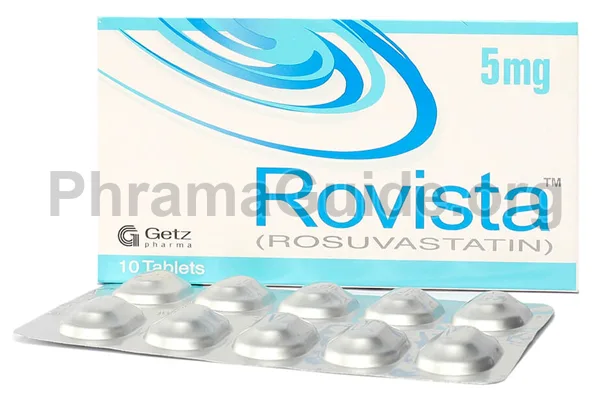Rovista is a medication commonly prescribed to lower cholesterol levels in the body. Like all medications, it can have side effects. Common side effects are those that are frequently reported, while less common side effects are those that occur less frequently but are still possible. It’s important to note that not everyone will experience these side effects, and some people may experience side effects that are not listed here. If you’re prescribed Rovista, you should discuss potential side effects and any concerns with your healthcare provider. Here are common and less common side effects of Rovista.
Common Side Effects:
- Muscle Pain (Myalgia): Muscle pain or weakness is one of the most frequently reported side effects of statins, including Rovista. In rare cases, this can progress to a more serious condition called rhabdomyolysis.
- Headache: Some people may experience headaches while taking Rovista.
- Nausea and Vomiting: Gastrointestinal symptoms, including nausea and vomiting, can occur.
- Abdominal Pain: Some individuals may experience abdominal discomfort or pain while taking Rovista.
- Constipation or Diarrhea: Changes in bowel habits can sometimes be associated with Rovista use.
- Fatigue: Some users of Rovista may feel more tired than usual.
Less Common Side Effects:
- Liver Abnormalities: Rarely, Rovista can affect liver function, leading to elevated liver enzymes. This is typically monitored with blood tests.
- Allergic Reactions: Allergic reactions to Rovista are rare but can include symptoms like skin rashes, itching, and swelling of the face, lips, or tongue.
- Memory and Cognitive Changes: Some people have reported cognitive effects with the use of Rovista, like memory loss or confusion, but these are relatively uncommon.
- Increased Blood Sugar Levels: In some cases, Rovista can cause a slight increase in blood sugar levels, which may be a concern for individuals with diabetes or at risk of diabetes.
- Sleep Disturbances: Sleep problems such as insomnia or nightmares have been reported by a small number of users of Rovista.
- Pancreatitis: Although rare, Rovista use has been associated with pancreatitis, which can cause severe abdominal pain.
- Hemorrhagic Stroke: While Rovista is generally associated with a reduced risk of stroke, there have been rare reports of hemorrhagic stroke (bleeding in the brain) associated with their use.

What is Rovista?
Rovista is one of the leading brands of Rosuvastatin, manufactured and marketed by Getz Pharmaceuticals, Pakistan.
Rovista : Available Formulations and Strengths
Presently, Rovista is available in tablets form
Rovista Tablets : 5mg, 10mg, and 20mg strengths
What Are The Possible Drug Interactions of Rovista?
- Other Cholesterol-Lowering Medications (Statins): Combining Rovista with other statin medications can increase the risk of side effects, especially muscle pain and weakness. The use of multiple statins should be closely monitored and usually avoided.
- Cyclosporine: This immunosuppressant medication can significantly increase the blood levels of statin, increasing the risk of adverse effects. It’s generally not recommended to use these medications together.
- Gemfibrozil: Gemfibrozil, a fibrate medication used to lower triglycerides, can increase the risk of muscle-related side effects when taken with Rovista. Using these medications together is typically discouraged.
- Niacin (Nicotinic Acid): Combining niacin with Rovista may increase the risk of muscle-related side effects. This combination should be used with caution and monitored by a healthcare provider.
- Certain Antibiotics: Some antibiotics, like clarithromycin and erythromycin, can raise the levels of statin in your blood, potentially increasing the risk of side effects.
- Protease Inhibitors (used for HIV): Medications like ritonavir, used to treat HIV, can interact with Rovista, increasing its blood levels and the risk of side effects.
- Warfarin (Coumadin): Rovista can potentially interact with warfarin, an anticoagulant. This interaction can increase the risk of bleeding, and your doctor may need to adjust your warfarin dosage.
- Antacids: Some antacids containing aluminum and magnesium can reduce the absorption of Rovista. If you need to take antacids, it’s generally recommended to take them at least 2 hours after or 2 hours before taking Rovista.
- Grapefruit Juice: Grapefruit juice can interfere with the metabolism of several medications, including Rovista. Avoiding grapefruit juice while taking Rovista is advisable.
- Certain Heart Medications: Medications like amiodarone (used for heart rhythm disorders) and verapamil (a calcium channel blocker) can interact with Rovista, potentially increasing the risk of muscle-related side effects.

Leave A Comment